July 27, 2016 •
Indiana’s Lt. Gov. Holcomb Picked to Replace Pence
The Republican Central Committee has nominated Lt. Gov. Eric Holcomb for governor. On July 27, 2016, 22 committee members, comprised of party insiders and elected officials, choose Gov. Pence’s replacement from four potential gubernatorial candidates. Holcomb beat out U.S. Reps. […]
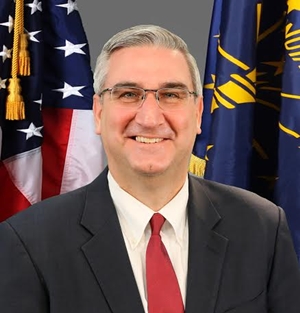 The Republican Central Committee has nominated Lt. Gov. Eric Holcomb for governor.
The Republican Central Committee has nominated Lt. Gov. Eric Holcomb for governor.
On July 27, 2016, 22 committee members, comprised of party insiders and elected officials, choose Gov. Pence’s replacement from four potential gubernatorial candidates.
Holcomb beat out U.S. Reps. Susan Brooks and Todd Rokita and state Sen. Jim Tomes.
Photo of Lt. Governor Eric Holcomb courtesy of the State of Indiana website.
April 13, 2016 •
Indianapolis Council Approves Ethics Reform
The City-County Council passed a proposal earlier this week to amend Indianapolis-Marion County ethics and lobbying laws. The proposal creates employment restrictions and post-employment restrictions for city-county employees and certain officials. A current official, the deputy mayor, and any individual […]

The City-County Council passed a proposal earlier this week to amend Indianapolis-Marion County ethics and lobbying laws. The proposal creates employment restrictions and post-employment restrictions for city-county employees and certain officials.
A current official, the deputy mayor, and any individual with appointment authority may not be employed by or work as a subcontractor for any person with a contract or arrangement with an agency. Moreover, former employees must wait one year before being employed as a lobbyist following termination of employment with the city or county.
All government contracts will require vendors to certify adherence to the employment restrictions. The proposal also adds things of value to the list of reportable lobbyist gifts and requires lobbyists to list the name of the official, appointee, or employee receiving a reportable gift. Lastly, the proposal amends penalties for lobbyists and their firms for registration, reporting, and ethics violations.
March 24, 2016 •
Lobbying Ordinance Proposed in Indianapolis
Mayor Joe Hogsett has introduced a proposed ordinance to the City Council, intending to update the city’s lobbying laws. The proposed ordinance would require lobbyists to disclose any gift of $25 or more. Additionally, the ordinance would prohibit a current […]
 Mayor Joe Hogsett has introduced a proposed ordinance to the City Council, intending to update the city’s lobbying laws.
Mayor Joe Hogsett has introduced a proposed ordinance to the City Council, intending to update the city’s lobbying laws.
The proposed ordinance would require lobbyists to disclose any gift of $25 or more. Additionally, the ordinance would prohibit a current public official from having an employment contract with any organization doing business with the city. The ordinance would also forbid a former public employee from lobbying within one year following employment. The ordinance also would increase penalties for violations.
If the ordinance is adopted, it will become effective immediately.
March 11, 2016 •
Indiana General Assembly Adjourns Sine Die
The Indiana General Assembly adjourned its 2016 season sine die on March 10. Gov. Mike Pence has until March 17 to take action on any bills presented to him. In Indiana, if no action is taken within seven days of […]
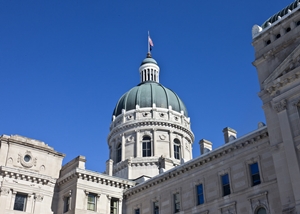 The Indiana General Assembly adjourned its 2016 season sine die on March 10. Gov. Mike Pence has until March 17 to take action on any bills presented to him.
The Indiana General Assembly adjourned its 2016 season sine die on March 10. Gov. Mike Pence has until March 17 to take action on any bills presented to him.
In Indiana, if no action is taken within seven days of presentment, bills automatically become law.
Photo of the Indiana Statehouse by HstryQT on Wikimedia Commons.
August 10, 2015 •
Indiana Governor Ends Contract and Seeks Ethics Investigation
Gov. Mike Pence has cancelled a contract between the state Bureau of Motor Vehicles (BMV) and Express MVA and requested an investigation due to possible ethics violations. Shawn Walters, formerly the BMV chief of staff, had approved Express MVA’s opening […]
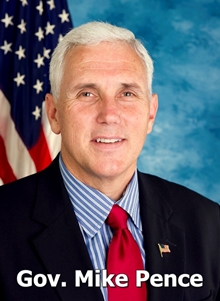 Gov. Mike Pence has cancelled a contract between the state Bureau of Motor Vehicles (BMV) and Express MVA and requested an investigation due to possible ethics violations.
Gov. Mike Pence has cancelled a contract between the state Bureau of Motor Vehicles (BMV) and Express MVA and requested an investigation due to possible ethics violations.
Shawn Walters, formerly the BMV chief of staff, had approved Express MVA’s opening of a private license branch in 2010. However, when Walters moved from state employment to become the chief operating officer of Express MVA in 2014, he did not ask the state Ethics Commission if such a move would violate the state’s law requiring a one-year cooling-off period.
In addition to ending the contract, Pence has asked the inspector general to determine if Walters violated any ethics law by accepting a job with Express MVA.
May 6, 2015 •
Indiana Governor Signs Ethics Bill into Law
Indiana Gov. Mike Pence signed House Bill 1002 into law on Monday, May 4. The ethics bill makes changes in the laws governing legislative ethics, lobbyist and legislative liaison reporting, and executive agency ethics. Some changes include expanding disclosure requirements […]
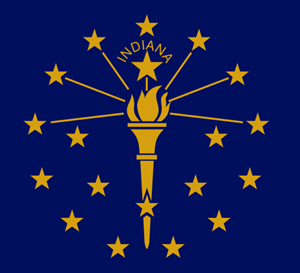 Indiana Gov. Mike Pence signed House Bill 1002 into law on Monday, May 4. The ethics bill makes changes in the laws governing legislative ethics, lobbyist and legislative liaison reporting, and executive agency ethics.
Indiana Gov. Mike Pence signed House Bill 1002 into law on Monday, May 4. The ethics bill makes changes in the laws governing legislative ethics, lobbyist and legislative liaison reporting, and executive agency ethics.
Some changes include expanding disclosure requirements on legislators’ statements of economic interests, requiring both houses of the Legislature to adopt a code of ethics, requiring lobbyists to report the name of any legislator who is a close relative, limiting the circumstances in which post-employment restrictions on employees of the executive branch may be waived, and changing post-employment restrictions for state officers, employees, and special state appointees.
All provisions are effective July 1, 2015.
April 30, 2015 •
Indiana General Assembly Adjourns Sine Die
The 119th Indiana General Assembly adjourned its first regular session sine die on Wednesday, April 29. Lawmakers worked until the final minutes to shift authority over education policy matters and to pass a new two-year state budget. Despite its many […]
 The 119th Indiana General Assembly adjourned its first regular session sine die on Wednesday, April 29. Lawmakers worked until the final minutes to shift authority over education policy matters and to pass a new two-year state budget.
The 119th Indiana General Assembly adjourned its first regular session sine die on Wednesday, April 29. Lawmakers worked until the final minutes to shift authority over education policy matters and to pass a new two-year state budget.
Despite its many successes, however, the session will perhaps best be remembered for the March 26 signing of the controversial Religious Freedom Restoration Act.
Photo of the Indiana Statehouse by HstryQT on Wikimedia Commons.
February 23, 2015 •
Indiana House Passes Bipartisan Ethics Bill
Indiana House legislators unanimously approved a bipartisan ethics bill aimed at maximizing transparency in the General Assembly. The reform bill broadens what legislators must disclose on financial interest statements and expands reporting requirements regarding lawmakers’ relationships with lobbyists. The bill […]
 Indiana House legislators unanimously approved a bipartisan ethics bill aimed at maximizing transparency in the General Assembly.
Indiana House legislators unanimously approved a bipartisan ethics bill aimed at maximizing transparency in the General Assembly.
The reform bill broadens what legislators must disclose on financial interest statements and expands reporting requirements regarding lawmakers’ relationships with lobbyists. The bill also tightens the control over state employees seeking employment in the private sector with a company involved with the state.
The bill now heads to the Senate.
Photo of the Indiana Statehouse by HstryQT on Wikimedia Commons.
January 19, 2015 •
Indiana Ethics Bill Introduced with Bipartisan Support
Indiana House Speaker Brian Bosma and House Minority Leader Scott Pelath have co-sponsored an ethics bill aimed at improving transparency and reducing conflicts of interest. The proposal would tighten the rules on waivers for the one-year “cooling off” period for […]
 Indiana House Speaker Brian Bosma and House Minority Leader Scott Pelath have co-sponsored an ethics bill aimed at improving transparency and reducing conflicts of interest.
Indiana House Speaker Brian Bosma and House Minority Leader Scott Pelath have co-sponsored an ethics bill aimed at improving transparency and reducing conflicts of interest.
The proposal would tighten the rules on waivers for the one-year “cooling off” period for state agency officials taking private-sector jobs dealing with their former departments.
It would also expand the financial disclosure requirements for legislators and require them to disclose any relatives who are lobbyists.
October 15, 2014 •
Marion Superior Judge Selection Ruled Unconstitutional
A federal judge in Indianapolis ruled the statute delineating how Marion Superior judges are elected is unconstitutional. The election of Marion Superior judges is unique, as Republican and Democratic parties may nominate up to half of the open positions. Furthermore, […]
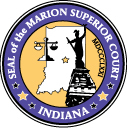 A federal judge in Indianapolis ruled the statute delineating how Marion Superior judges are elected is unconstitutional. The election of Marion Superior judges is unique, as Republican and Democratic parties may nominate up to half of the open positions.
A federal judge in Indianapolis ruled the statute delineating how Marion Superior judges are elected is unconstitutional. The election of Marion Superior judges is unique, as Republican and Democratic parties may nominate up to half of the open positions.
Furthermore, once a judge wins in the primary, he or she will automatically be elected in the general because there are as many candidates as there are open seats. Because primaries are restricted to the two major parties, only those eligible to vote in the primary elections are able to cast meaningful votes for the open judgeships, and those who do not declare a party have no say in the election of the judges.
The court found the statute severely burdens the right to vote. The ruling is stayed and will not affect next month’s election.
May 9, 2013 •
Indiana Governor Signs Legislative Lobbying Law
Enrolled Act 1222 changes regulations for registration and reporting

Governor Mike Pence has signed a bill to change legislative lobbying regulations. Enrolled Act 1222 expands the definition of lobbying to include communications with any employee of the legislative branch and requires lobbyists to file registration statements and activity reports electronically.
The bill also increases the annual lobbyist registration fee from $100 to $200 and makes the lobbyist registration year match the current lobbyist reporting periods. Lobbyist registration statements issued for 2013 will expire November 1, 2013.
Most of the bill’s provisions become effective July 1, 2013.
April 29, 2013 •
Indiana Legislature Passes Lobbying Bill Before Adjourning
Enrolled Act 1222 awaits Governor’s approval
 The Legislature adjourned Saturday, April 27, 2013, shortly after passing a bill to change lobbying regulations. Enrolled Act 1222 expands the definition of lobbying to include communications with any legislative employee and requires lobbyists to file registration statements and activity reports electronically.
The Legislature adjourned Saturday, April 27, 2013, shortly after passing a bill to change lobbying regulations. Enrolled Act 1222 expands the definition of lobbying to include communications with any legislative employee and requires lobbyists to file registration statements and activity reports electronically.
The bill also increases the annual lobbyist registration fee from $100 to $200 and makes the lobbyist registration year match the current lobbyist reporting periods. Lobbyist registration statements issued for 2013 will expire November 1, 2013.
Most of the bill’s provisions will become effective July 1, 2013, following approval by the Governor.
Photo of the Indiana State House by Jasont82 on Wikipedia.
March 4, 2013 •
Indiana Considers Increase and Expansion of Lobbying Regulation
House Bill 1222 had no problem making it to Senate committee
 A bill to change lobbying regulations has passed the House and is currently in the Senate Committee on Public Policy.
A bill to change lobbying regulations has passed the House and is currently in the Senate Committee on Public Policy.
House Bill 1222 expands the definition of lobbying to include communications with any legislative employee and requires lobbyists to file registration statements and activity reports electronically.
The bill also increases the annual lobbyist registration fee from $100 to $200 and makes the lobbyist registration year match the current lobbyist reporting period.
The bill passed the House 94-0 on February 25, 2013.
November 26, 2012 •
Indiana General Assembly Holds Organization Day
Legislative session to begin January 7, 2013
 On November 20, 2012, lawmakers met for Organization Day, the first official day of the 118th General Assembly.
On November 20, 2012, lawmakers met for Organization Day, the first official day of the 118th General Assembly.
Lawmakers will reconvene on January 7 for the start of the legislative session, which must be adjourned by April 29, 2013.
Organization Day is largely procedural, including the ceremonial swearing in of new and reelected members.
Photo of the Indiana State House by Jasont82 in Wikipedia Creative Commons.
State and Federal Communications, Inc. provides research and consulting services for government relations professionals on lobbying laws, procurement lobbying laws, political contribution laws in the United States and Canada. Learn more by visiting stateandfed.com.


